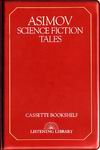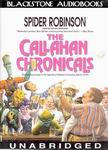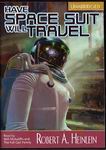
 Asimov Science Fiction Tales
Asimov Science Fiction Tales
By Isaac Asimov; Read by Isaac Asimov
2 Cassettes – 117 Minutes [UNABRIDGED]
Publisher: Listening Library
Published: 1985 – Out Of Print
ISBN: 0807234184
Themes: / Science Fiction / Poetry / Storytelling / Artificial Intelligence / Robots / Mathematics / Parallel Worlds /
Written and read by Isaac Asimov, Asimov Science Fiction Tales is a collection of four short stories and one poem, all from Asimov’s golden era, the 1950s. Though cover art is non-existent, the audiobook comes packaged in a heavy duty vinyl case that is extremely durable. This two cassette production from Listening Library is a repackaged selection of tales written and read by Asimov from the 1975 collection entitled Science Fiction Favorties: Isaac Asimov (ISBN 0807229288), which includes at least five other stories that are not included here.
Listening to Asimov Science Fiction Tales is like spending some quality time with the man himself. Asimov’s reading is informal. He introduces and comments on each of the tales both before and after the reading, placing them in context and revealing their origins. His comments are insightful and sometimes quite humourous. The stories themselves are some of his best, featuring familiar Asimov themes, some serious, others funny, all great listening.
Stories Included:
Introduction – Asimov extemperaneously expounds on the wonderfulness of good old fashioned reading.
I Just Make Them Up, See – A infamous Asimov limerick, this one attempts to answer the question “Where do you get the ideas for your stories?” It’s a silly poem and but it left me smiling.
Someday – The first of two stories in this collection that deals with “lost arts”. In a society that has forgotten the written word, two young boys upgrade an antique automated audiobook machine called a “bard” – giving it a new vocabulary so that it can tell modern stories. This is one of Asimov’s most perfectly constructed stories, a real winner.
The Feeling of Power – A far future society that has become completely dependent upon computers rediscovers the lost art of doing math by hand. Very clever and well concieved, this story has more to say about our own society than it did about the time in which it was written.
Satisfaction Guaranteed – Housewife Claire Belmont is startled to find her husband’s most recent aquistion, a human looking robot named “Tony”, is the latest gimmick in the ceaseless battle to keep up with the Joneses.
Living Space – The discovery of easy access to parallel universe Earths, ones where life never evolved, means that the ever expanding human population of the future needn’t worry about running out of living space. In fact, every family can have a whole planet to themselves! But some unforseen consequences of this discovery have got a few of the new homeowners worried. This is one of the best executed science fiction short stories ever written. Its premise entails a non-obvious problem that becomes clear only near the end of the tale. Highly recommended.

 A Song Before Sunset
A Song Before Sunset

